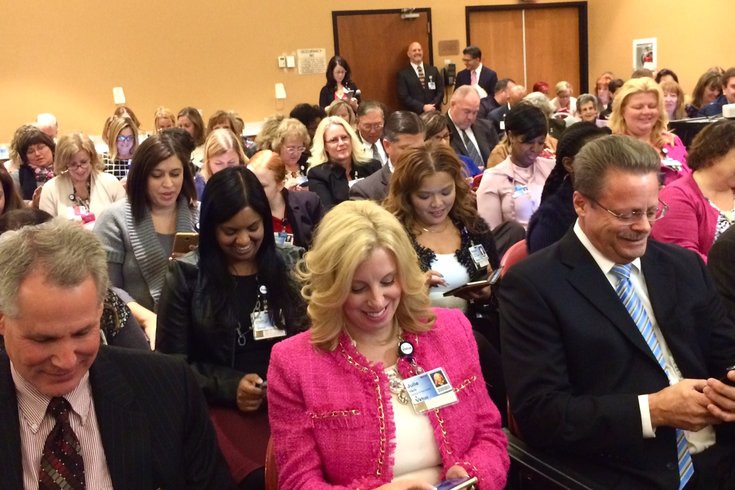
November 20, 2015
 KEVIN C. SHELLY//PHillyVoice
KEVIN C. SHELLY//PHillyVoice
More than 400 volunteer rescuers, willing to provide CPR, signed up for a phone app known as PulsePoint rolled out by Virtua and Burlington County officials on Friday. Immediate CPR increases survival by 500 percent when there is a cardiac arrest.
Seconds matter.
A person in cardiac arrest has a staggering 500 percent better survivability rate when a bystander immediately provides CPR, rather than waiting for professional first-responders to arrive, according to Scott Kasper, Virtua's assistant vice president for emergency services.
“That’s the number one impact for survivability,” along with the availability of an automated defibrillator, he told 400 healthcare system employees Friday morning.
That’s why Kasper had the entire audience assemble in Voorhees, which also included elected officials and emergency workers, download and install a smartphone app called PulsePoint.
The app, paid for by Virtua but rolled out with the support of Burlington County, picks up on 911 calls indicating a heart attack.
At the same time EMS is dispatched, anyone who has downloaded the app and has had CPR training that is within a quarter mile of the incident gets an alert.
Using locator and mapping technology, Good Samaritans get the location of nearby defibrillators – even locations in specific rooms – as well as directions to the scene.
The app even reviews CPR techniques and sets a metronome in motion to guide a volunteer responder through the lifesaving rhythm of applying pressure to the chest to keep blood flowing, Kasper said.
“It is phenomenally user-friendly,” he added. “Survival starts with the community.”
When professionals arrive at the scene of a cardiac event, they tap out the Good Samaritan and take over resuscitation work, Kasper explained.
Virtua is covering the costs of the app, which included a $10,000 set-up fee and has an annual subscription charge that runs another $13,000.
Richard P. Miller, the CEO and president of Virtua, said it's the first use of the technology in the region.
Jersey City and several large urban areas have rolled out PulsePoint. One of the locations, Spokane, has the best cardiac survivability rate in the country.
Miller said Virtua will provide cost-free CPR training to enhance the effectiveness of the app.
Kasper hopes the relatives and family of anyone who downloads the app will also download the app, multiplying the voluntary rescuers.
“It’s a legal pyramid scheme,” he joked.
The app’s limitations are few, but significant.
Volunteer rescuers will only be summoned to public places, not to a patient’s residence, Kasper said, due to safety concerns.
The app also only works within the borders of Burlington County.
And while multiple alerts will go out if there are several potential rescuers near an incident, the alert is turned off when the first rescuer arrives and checks in, Kasper said.